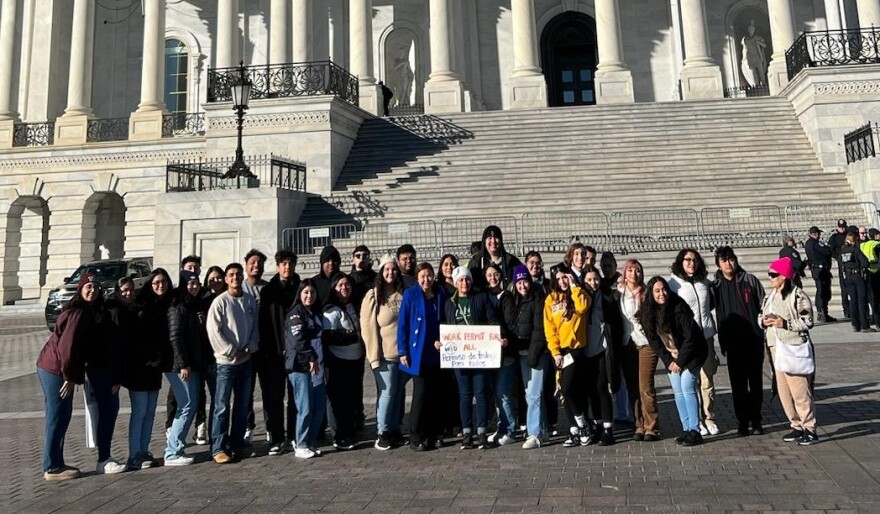Social empowerment aims at improving the social status and well-being of individuals or marginalized groups in society. At universities, advocating for social empowerment many times happens outside the classroom. Importantly, advocating for one’s own cultural group can be empowering, boosting one’s sense of self-esteem and agency.
In September 2023, the Western Illinois University Department of Political Science, together with AMPLIFY, the Latin American Student Organization, and the African Student Association celebrated the International Day of Peace and discussed reasons why people from Latin America and Africa are displaced from their home countries. Later in the Fall, Guadalupe Villagomez-Ortiz, from Gamma Phi Omega International Sorority Inc., invited me to participate in an event where we wrote letters for asylum seekers staying in shelters in Chicago.
After seeing the level of immigrant justice awareness among our students, when an opportunity to advocate in DC asking President Biden to approve work permits for long term residents came up, I (we) jumped at it. We all have read about the plight of asylum seekers who arrived in recent years, especially those coming from Venezuela who walk for months through treacherous areas. But what about the persons that have been in the country for decades, don’t they have the right to a work permit also?
This argument resonated with 37 students at WIU from a diversity of departments, most of whom were first- and second-generation Latino/a immigrant.
“My brother has DACA,” said one student referring to the program established by Obama to provide a work permit for undocumented immigrants who arrived in the country as children.
“My dad didn’t have documents when I was growing up and that was a struggle for the family,” shared another student at our organizational meeting.
On November 13, 2023, with support from a nonprofit in Chicago, the WIU Foundation, and an anonymous donor, we left for Washington DC on two charted buses. Despite getting a flat tire on the way there, the experience was invaluable: we met with congresspersons from both political parties and participated in a day of action in front of the White House.
Rather than giving you my own perspective, I would like to use the rest of this commentary to share students’ reflections on the advocacy trip to DC.
Winter Hurst-Leadicker, a Political Science major, when asked why they went to the DC trip said that people need to get their voices heard if they want change to happen, by advocating to Congress and the President, who represent the spirit of the nation.
Guadalupe Villagomez-Ortiz, a Psychology major, thought the trip to DC was one of a kind because being surrounded by people who shared one’s passion and seeing people holding signs stating the number of years they had been waiting for a permit, visually seeing what other people had gone through, made the experience unique.
Finally, Jaime Marban, a graduate student in Public Safety Administration, explained the meaning of the experience perfectly. For him, education is the foundation for change, and being able to see students put their education into action through collaboration and cooperation, showed the power of union, how la unión hace the fuerza (union builds strength). “If we really come together as one,” Jaime explained, “we can make a voice people can’t ignore.”
If you want to learn more about the experiences of these students, you can watch this video by WIU Television.
Julia Albarracin-Green is a Professor of Political Science at Western Illinois University.
The opinions expressed are not necessarily those of the university or Tri States Public Radio.
Diverse viewpoints are welcomed and encouraged.


